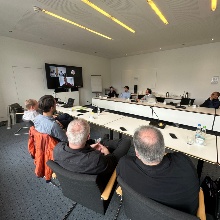Funding and the search for co-founders are two of the major stumbling blocks on the path to a successful start-up. Without co-founders, this often means the end of a knowledge-based start-up - at least if support is sought through state funding programmes such as EXIST. What creative ways are there for start-ups in search of co-founders? This question was the focus of the fifth meeting of the Startup Campus 0711 Think Tank.
In his welcome address, host Bernhard Grieb, Economic Development Officer of the City of Stuttgart, emphasised the pleasing development in the state capital. It is currently reinventing itself to a certain extent in terms of start-up activities. The city wants to support as much as it can and is very interested in keeping up-and-coming start-ups in the region. Particularly with affordable commercial real estate and low-threshold networking offers, the conditions for settling in the city are improving.
Professor Peter Middendorf, Vice Rector for Knowledge and Technology Transfer, opened the meeting with a look at the start-up pipeline of the University of Stuttgart and the Stuttgart Media University (HdM): Twelve teams at the university and five teams at the HdM are currently urgently looking for co-founders. Business economists are particularly sought after at the university - because the core idea for the start-up often stems from the research work at the technology institutes. At the HdM, there is a shortage of back-end and front-end developers. Against the background of the shortage of skilled workers and the geographical location in the middle of one of the strongest economic regions in Europe, which binds skilled workers with highly remunerated employment contracts, the difficulties in finding co-founders become understandable.
Kimon Georgiou, Head of Partnership, presented the JobTeaser platform. It specialises in matchmaking between young professionals from universities and job offers in companies. For universities, the portal, as their own presence, is currently free of charge. This also opens up a way for start-ups at universities to advertise for co-founders in bundled form and to find targeted co-founder positions in university start-ups for graduates.
Andy Clifton, co-founder of enviConnect, impressively described the long and exhausting path that his co-founder Ines Würth and he had taken until they successfully found the third member of the group - John Rayan. Finding a suitable founder or co-founder is very different from filling a vacancy in a company. They are not just looking for the right skills, they are looking for a person who fits into the team, whose vision of cooperation and project success is a good match. Do the values match? And what does the gut feeling say? Can we not only be a team, do we want to be one?
A co-founder is not a co-worker. With this in mind, Clifton and Würth relaunched their search after a few failures. A job description became a people description. And a job ad became a call for support. The two founders also addressed the issue of diversity. What do they understand by the term and how do they implement diversity? In the context of the co-founder search, for example, they subjected their texts to a gender decoder so as not to address interested parties in a one-sided way. They have a good tip for all searchers: Work with the potential co-founders in a small test project. That's what Clifton and Würth did, and at the end of the four-month search, the founding duo became a trio. Their application for EXIST funding in December 2022 already received a positive decision in March 2023. The first orders for enviConnect, which uses software to improve Windlidar fleet management, have arrived. By 2025, the team wants to expand by up to seven employees. They now know how to do this successfully.
In the exchange among themselves, the attendees discussed further opportunities to match start-ups with suitable co-founders. Eric Heintze, from the state initiative "Gründermotor", suggested creative alumni management: Start-up Recycling! If only one of ten start-ups is retained in the long term, there are people with diverse start-up experience from nine start-ups. Those who have failed successfully, who no longer pursue an interesting but not sustainable business model, often have not only the experience but also the more suitable spirit to rejoin a start-up.
It is also important to work on keeping teams together, described Hartmut Rösch, head of the Start-up Centre at the HdM, one of the coaching tasks at Startup Campus 0711. Start-up journeys are intense, conflicts are inevitable - how the conflicts are handled can play a decisive role in whether teams grow together or are blown up. Especially in the early stages, imploding teams can lead to a good idea no longer being pursued.
For Dr. Andreas Chatzis from the Economic Development Agency of the City of Stuttgart, in addition to networking at matchmaking events as a concerted action in the metropolitan region, a productive way lies in activating business angels - not even for the sake of investment, but as an extension of network contacts.
Aaron Bahnmüller, Bosch, and René Ackel-Zakour, Mercedes-Benz, also see potential for exciting matchmaking with people at the end of a corporate career. Thinking about diversity across generations can take a lot of turbulence out of a start-up, especially in the area of finance and organisational development. Cooperation across employees of all generations between companies and start-ups could have further advantages for both partners. This point will be explored in further discussions.
Contact

Melanie Minderjahn
Career Service - Inner Development, Public Relations


